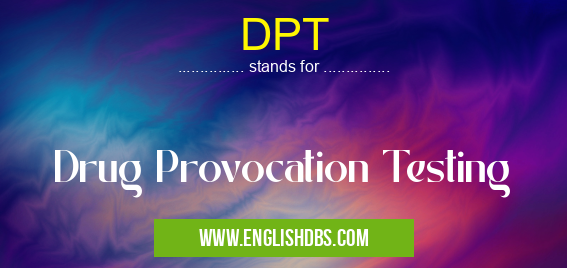What does DPT mean in CLINICAL MEDICINE
Drug provocation testing (DPT) is a medical procedure used to identify the cause of a person’s allergic reaction. It can be used to diagnose allergies to drugs, food, or other substances. The procedure involves exposing the patient to small amounts of the potential allergen and observing their reaction over time. This test can be used for diagnosing allergies as well as for monitoring a patient’s response to treatment.

DPT meaning in Clinical Medicine in Medical
DPT mostly used in an acronym Clinical Medicine in Category Medical that means Drug Provocation Testing
Shorthand: DPT,
Full Form: Drug Provocation Testing
For more information of "Drug Provocation Testing", see the section below.
What DPT is
Drug provocation testing (DPT) is an allergy testing method that involves introducing controlled amounts of a suspected allergen into the body in order to determine if it causes an allergic reaction. This type of testing requires an experienced health care provider and should only be done in a clinical setting due to its risks. During the test, small doses of the suspected allergen are injected into the skin or administered orally. If there is no allergic reaction within two hours, then an increased dose will be given until a reaction occurs or until the maximum dose has been reached.
How DPT Works
Drug provocation testing begins with a medical history and physical examination by a healthcare provider. In some cases, blood and skin tests may be performed first in order to confirm results or narrow down possible allergens that need further exploration during DPT. During drug provocation testing, increasing doses of a suspected allergen are administered until either a reaction occurs or until the maximum safe dose has been reached without any symptoms appearing. Symptoms such as itching, hives, swelling, difficulty breathing, abdominal pain, nausea or vomiting are monitored and recorded in order to evaluate if there is an allergic response occurring after exposure.
Risks Involved with Drug Provocation Testing
Although drug provocation testing is considered safe when performed by qualified specialists in specialized clinical environments under careful observation, it does carry some risks including systemic reactions such as anaphylaxis (a severe whole-body allergic reaction). Serious reactions are rare but do occur; therefore close monitoring by medical professionals during and following this type of test is necessary for safety reasons. Additionally, because this type of allergy testing exposes patients to potential allergens there can also be psychological side effects including fear and anxiety associated with facing one’s own allergies head-on during this process.
Essential Questions and Answers on Drug Provocation Testing in "MEDICAL»CLINICAL"
What is Drug Provocation Testing?
Drug provocation testing is a type of experiment involving the intentional introduction of a potential allergen into an individual's body to determine if it triggers an allergic reaction. It is commonly used to test for drug allergies, although it can be used to identify other types of allergens as well.
Who should consider undergoing Drug Provocation Testing?
Drug provocation testing may be recommended to those who have had unexpected reactions to medications or similar substances in the past, or people with severe allergic reactions with no known causative agent. It may also be useful for people with conditions where skin testing isn’t reliable or accurate.
How is Drug Provocation Testing administered?
Generally, drugs are administered in escalating doses until an allergic reaction occurs or until the maximum dose has been reached. Depending on the severity and type of potential allergen, this test may take place in an allergist’s office or a hospital-based clinical setting with proper emergency equipment on-site.
What kind of safety protocols are involved in Drug Provocation Testing?
While drug provocation tests can provide valuable information about potential allergies and sensitivities, they must be done with extreme caution due to the risk of triggering dangerous reactions. Allergists will monitor the patient closely throughout the process and will always have emergency equipment available should any adverse effects occur.
Are there any risks associated with Drug Provocation Testing?
As with any medical procedure, there are some risks associated with drug provocation testing including but not limited to potential allergic reactions and medication side effects/interactions. The individual must weigh these risks against any possible benefit that may arise from completing this test before deciding whether or not to proceed.
What happens after a positive result from Drug Provocation Testing?
If you receive a positive result from drug provocation testing, your doctor will work on determining the best course of action for managing any related allergies or sensitivities through avoidance strategies, medication plans, immunotherapies or other treatments as needed. They will also review alternative medication options if necessary.
Is Drug Provocation Testing ever used for children?
In some cases, yes - though it remains controversial due to increased safety concerns when dealing with very young children and infants who cannot communicate their symptoms clearly. This test should only ever be done under strict supervision by trained healthcare professionals who understand how to safely administer such tests in pediatric patients if deemed necessary.
Final Words:
In conclusion, Drug provocation testing (DPT) is an important diagnostic tool used by healthcare providers when trying to pinpoint what causes a person’s allergic reactions and sensitivities. It requires careful observation by experienced personnel due its potential risks but can offer valuable insight into managing allergies more effectively when done correctly.
